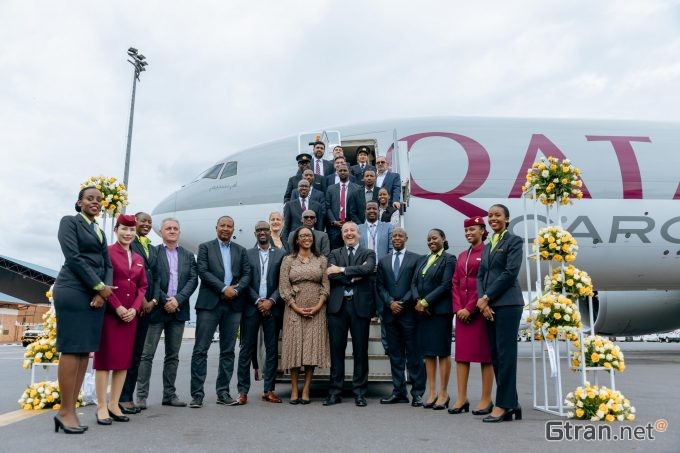RwandAir's cargo division is on a mission to transform its operations following a partnership with Qatar Airways, but opening Africa’s huge market is where the real benefits lie.
The two airlines are positioning Kigali, the Rwandan capital, as a regional cargo hub. The new arrangement started earlier this month with Qatar flying a 777F aircraft from Doha to Kigali, twice a week with a scheduled onward service to Entebbe, Nairobi and Liège then back to Doha via either Oslo or Lyon.
RwandAir has seen cargo uplift rise by 25% over the last five years and the new freight hub will help tap into the export and import markets around Africa, and strengthen links with key overseas markets.

Last year, RwandAir introduced a 737-800SF dedicated freighter to launch operations within Africa and the Middle East from Kigali, and since March this year, Qatar Airways Cargo started an intra-Africa service between Kigali and Lagos (three times per week), and a weekly service from Istanbul via Doha to Kigali, all operated by an A310F.
Partnerships between major global airlines and African carriers have historically been one-sided – with African operators getting the shorter end of the stick. However, a source at RwandAir told The Loadstar that the carrier could see clear benefits from partnering with Qatar, particularly in the area of visibility, additional capacity, access to Qatar’s global cargo market and the potential for revenue growth.
“We have plans to expand to different African markets, meaning more capacity and promoting intra-continental trade,” the source said.
Earlier this month, Guillaume Halleux, chief cargo officer at Qatar Airways, touched on the benefits of developing a reliable intra-African network through Kigali, as well as enhanced service levels and the cost synergies that can be achieved.
Bottlenecks in regional connectivity have often hindered growth in intra-African air services. Initiatives to create a single continental market are ongoing but painfully slow. However, once fully implemented, the establishment of a common African market will boost trade between African markets and stimulate cargo connectivity.
RwandaAir said it is looking to expand freighter services to different markets, hence improving connectivity, service delivery and making it affordable.
“In markets where we don’t operate, we are working with our other cargo partners via interline special pro-rate agreements to serve our customers,” the airline stated.
The case for an air cargo hub in Kigali appears strong. Rwanda is landlocked, and its economy is dominated by agriculture and other trade including textiles and clothing, livestock, and pharmaceuticals. Developing an effective gateway for shipments, particularly for perishables, could play out well for both carriers, especially if they can efficiently capitalise on Rwanda’s geographical location and catchment area.
Currently, imports and exports are predominantly via road through ports in Mombasa (Kenya) and Dar es Salaam in Tanzania, some 1,500 km away. Commercial traffic by road is often subject to delays, logistical problems, high transportation costs and occasional theft causing delays when importing goods into Rwanda, according to observations by the International Trade Administration in the US. Consequently, shipping insurance and freight forwarding services may prove difficult to acquire in Rwanda.
The Rwandan economy showed resilience despite a challenging economic environment in 2022 following the Covid pandemic but despite these challenges, real GDP grew by 8.2% in 2022 according to data from the World Bank. Growing trade links will prove vital in support of cargo movements including a trade agreement with Qatar signed in 2018.
RwandAir recently took delivery of a third A330-300, and that belly capacity will offer the partnership some additional uplift on routes within Africa, Europe (including a new Paris link from June) the Middle East and China.
Currently RwandAir is in process of improving warehouse services, infrastructural renovations, system upgrades, racking and equipment acquisition. Recently, QAS Cargo, a subsidiary of Qatar Airways, provided consultancy support to RwandAir Cargo to help the division improve its cargo handling performance.
RwandAir is also undertaking the CEIV audit for both pharma and fresh certification as this will give the airline credibility when handling temperature-sensitive shipments.


